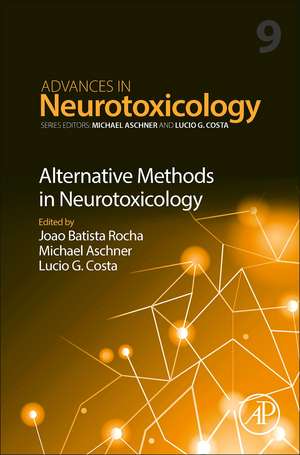Alternative Methods in Neurotoxicology: Advances in Neurotoxicology, cartea 9
Joao Batista Rocha, Michael Aschner, Lucio G. Costaen Limba Engleză Hardback – 24 mai 2023
Other chapters cover Human Neural Stem Cells in Developmental Neurotoxicology: Current Scenario and Future Prospects, Use of Drosophila melanogaster for advances in developmental neurotoxicology studies, 3D neurospheres and neurotoxicity of organophosphorus and TCE, Genetic factors in methylmercury-induced neurotoxicity: what we have learned from Caenorhabditis elegans models, and more.
- Give an up-to-date about the utilization of popular invertebrates (Drosophila melanogaster and Caenorhabditis elegans) in neurotoxicology
- Brings concise information on emerging invertebrate models in neurotoxicology (from basic to environmental approaches)
- Presents updates on the in vitro exploitation of human stem cell in developmental neurotoxicology
Preț: 874.47 lei
Preț vechi: 1213.71 lei
-28% Nou
Puncte Express: 1312
Preț estimativ în valută:
167.35€ • 174.07$ • 138.16£
167.35€ • 174.07$ • 138.16£
Carte tipărită la comandă
Livrare economică 07-21 aprilie
Preluare comenzi: 021 569.72.76
Specificații
ISBN-13: 9780443185823
ISBN-10: 0443185824
Pagini: 356
Dimensiuni: 152 x 229 x 23 mm
Greutate: 0.7 kg
Editura: ELSEVIER SCIENCE
Seria Advances in Neurotoxicology
ISBN-10: 0443185824
Pagini: 356
Dimensiuni: 152 x 229 x 23 mm
Greutate: 0.7 kg
Editura: ELSEVIER SCIENCE
Seria Advances in Neurotoxicology
Public țintă
The content covered will of interest for neuroscientists, environmental neurotoxicologists, occupational health care professionals, neurodevelopmental scientists and neurobiologists.Cuprins
Preface
Joao Batista Rocha, Michael Aschner and Lucio G. Costa
1. Assessment of mitochondrial function in neurotoxicology using alternative model organisms
Gonçalves, D.F., Michelotti, P, da Silva A.F., Soares, F.A.A. and Dalla Corte, C.L.
2. Planarians as a model to study neurotoxic agents
Danielle Ireland and Eva-Maria S. Collins
3. The role of Drosophila melanogaster in neurotoxicology studies: Responses to different harmful substances
Mustafa Munir Mustafa Dahleh and Marina Prigol
4. Neurotoxicology of metals and metallic nanoparticles in Caenorhabditis elegans
Danielle Araujo Agarrayua, Aline Castro Silva, Nariani Rocha Saraiva, Ana Thalita Soares, Michael Aschner and Daiana Silva Ávila
5. Neurotoxicology of organic environmental toxicants using Caenorhabditis elegans as a model
Marcell Valandro Soares, Gabriel Pedroso Viçozzi, Eugenia Carla Kuhn, Ann-Kathrin Weishaupt, Laura Kubens, Julia Bornhorst and Daiana Silva Avila
6. Nauphoeta cinerea as an emerging model in neurotoxicology
Isaac A. Adedara, Khadija A. Mohammed, Julia Canzian, Denis B. Rosemberg, Michael Aschner, Ebenezer O. Farombi and Joao B. T. Rocha
7. Human neural stem cells in developmental neurotoxicology: Current scenario and future prospects
Andreea Rosca, Raquel Coronel, Victoria Lopez, Isabel Liste and M. Carmen González-Caballero
8. Perspectives for advancing neurotoxicity studies with Drosophila
Catherine R. Beamish, Adwitia Dey, Souvarish Sarkar and Matthew D. Rand
9. Genetic factors in methylmercury-induced neurotoxicity: What have we learned from Caenorhabditis elegans models?
Tao Ke, Fernando Barbosa Junior, Abel Santamaria, Aaron B. Bowman and Michael Aschner
10. Usefulness of Drosophila in studying Parkinson’s disease and role of natural plant products
Himanshi Varshney and Yasir Hasan Siddique
11. Neurotoxicity of iron (Fe) in Drosophila and the protective roles of natural products
Kehinde D. Fasae, Olugbenga Adeyemi, Hameed O. Faleke and Amos O. Abolaji
Joao Batista Rocha, Michael Aschner and Lucio G. Costa
1. Assessment of mitochondrial function in neurotoxicology using alternative model organisms
Gonçalves, D.F., Michelotti, P, da Silva A.F., Soares, F.A.A. and Dalla Corte, C.L.
2. Planarians as a model to study neurotoxic agents
Danielle Ireland and Eva-Maria S. Collins
3. The role of Drosophila melanogaster in neurotoxicology studies: Responses to different harmful substances
Mustafa Munir Mustafa Dahleh and Marina Prigol
4. Neurotoxicology of metals and metallic nanoparticles in Caenorhabditis elegans
Danielle Araujo Agarrayua, Aline Castro Silva, Nariani Rocha Saraiva, Ana Thalita Soares, Michael Aschner and Daiana Silva Ávila
5. Neurotoxicology of organic environmental toxicants using Caenorhabditis elegans as a model
Marcell Valandro Soares, Gabriel Pedroso Viçozzi, Eugenia Carla Kuhn, Ann-Kathrin Weishaupt, Laura Kubens, Julia Bornhorst and Daiana Silva Avila
6. Nauphoeta cinerea as an emerging model in neurotoxicology
Isaac A. Adedara, Khadija A. Mohammed, Julia Canzian, Denis B. Rosemberg, Michael Aschner, Ebenezer O. Farombi and Joao B. T. Rocha
7. Human neural stem cells in developmental neurotoxicology: Current scenario and future prospects
Andreea Rosca, Raquel Coronel, Victoria Lopez, Isabel Liste and M. Carmen González-Caballero
8. Perspectives for advancing neurotoxicity studies with Drosophila
Catherine R. Beamish, Adwitia Dey, Souvarish Sarkar and Matthew D. Rand
9. Genetic factors in methylmercury-induced neurotoxicity: What have we learned from Caenorhabditis elegans models?
Tao Ke, Fernando Barbosa Junior, Abel Santamaria, Aaron B. Bowman and Michael Aschner
10. Usefulness of Drosophila in studying Parkinson’s disease and role of natural plant products
Himanshi Varshney and Yasir Hasan Siddique
11. Neurotoxicity of iron (Fe) in Drosophila and the protective roles of natural products
Kehinde D. Fasae, Olugbenga Adeyemi, Hameed O. Faleke and Amos O. Abolaji










